Versus (2000)
Directed by: Ryuhei Kitamura
Written by: Ryûhei Kitamura
Starring: Chieko Misaka, Hideo Sakaki, Kenji Matsuda, Tak Sakaguchi
JAPAN
AVAILABLE ON BLU-RAY: 7TH DECEMBER 2020, from ARROW VIDEO
RUNNING TIME: 115 mins
REVIEWED BY: Dr Lenera
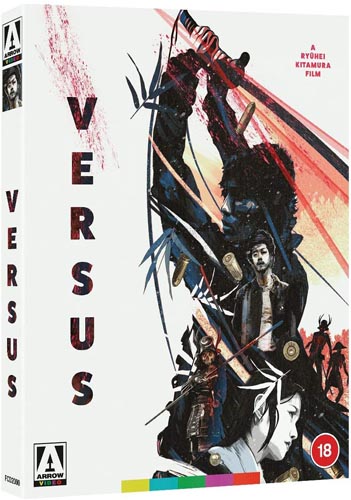
There are 666 hidden portals on Earth that connect this world to the other side. In Japan exists the 444th portal known as The Forest of Resurrection. In the 10th century, a lone samurai fends off a horde of zombies and, despite spotting a lone ally behind him, is then killed by a priest. In present-day Japan, two escaped prisoners meet up with a gang of yakuza who have kidnapped a girl. Prisoner KSC2-303 absconds with her, and the yakuza decide to disobey their orders to wait for their leader and chase after them, while the two cops that the escapees got away from are also in pursuit. But anyone who’s killed in this forest stands a very good chance of coming back to life….
Well you can’t say that the title is inappropriate. I actually first sat down to watch Versus a few months ago when a friend brought it round. He’d had it on DVD for some time though hadn’t seen it yet. Unfortunately the fact that we hadn’t seen each other for ages meant that we spent so much time we lost track of what was unfolding on the screen in front of is and, from about half way onwards, every time we looked at the TV it seemed to be the same two people fighting, usually in modern dress but at one point in samurai garb which really confused us. But if this sounds like I’m criticising Rhuyei Kitamura’s film then it’s not intentional. I was looking forward to watching it properly this time, especially as it would be a welcome contrast from Cinema Paradiso the last movie I reviewed; it’s one of my favourite films of all time but even the act of reviewing it was a very emotional and even personal experience. Even though the limited amount of funds available ensures that the whole film is set outside until the very final scene, the non-stop barrage of Mexican stand offs, zombies, martial arts, gunplay, swordplay, gore, comic book poses and cheesy dialogue more then did the trick for me, along with a plot that bizarrely manages to be both very basic and surprisingly complex at the same time; you could sum up the premise very quickly but there are a surprising number of twists in store for the viewer. Kitamura actually pulls off his seemingly ridiculously ambitious attempt to give us something like what a Japanese Highlander might have been if made by John Woo and George Romero on a very limited budget.
It was originally intended to be a sequel to Kitamura’s short film Down To Hell, entitled Down To Hell 2: The Return to be also shot on video, but as development of the screenplay progressed, it became a stand-alone tale. Kitamura raised the money to independently produce it by borrowing funds from friends and family after producers claimed a Japanese action film could never be as good as a much more expensive American or even a Hong Kong one. The budget of $10,000 was indeed extremely low, and the requirement of more money and bad weather extended what was intended to be a three-week shot to seven months, while the screenplay was constantly changing with much stuff made up on the spot. Star Tak Sakaguchi said that he met Kitamura when the latter was present at a street fight he was in; for years Kitamurai claimed they met through other means until he eventually admitted the truth of Sakaguchi’s story. Kitamura had trouble coming up with a new title; eventually a friend of his said to him, referencing his struggle to get his career started as well as a hobby when he was younger, “all your life you’ve been fighting, and this movie is all you, so you should call it Versus.” It was a solid success at the Japanese box office, but caused a considerable stir internationally despite the initial American version losing most of the gore because of four minutes of cuts. In 2004 Kitamura filmed ten-minutes worth of extra action footage as well as doing some re-editing, re-scoring and colour correction. Ultimate Versus is also on this Blu-ray release, and I will be looking at it later. Kitamura also wrote scripts for a proposed American remake and a sequel, though neither have come to fruition yet.
Some text introduces the premise of these portals and the fact that “a long time ago” somebody evil discovered the 444th one before we launch straight into a shot of gore as one brave samurai has dispatched a zombie and is surrounded by some more who are able to do combat stances though of course move very slowly. The samurai slashes at the screen and an aerial shot shows all the zombies still standing before amusingly crashing to the ground. Fighting, blood, fast camera moves and a sense of humour; it’s all here and lets you know exactly what you’re in for; you may as well opt out now if this brief prologue doesn’t take your fancy. The samurai then charges at a priest before being slain. The opening credits take us to the present day and two men running, one of them still having a severed hand on his hand-cuffs, to be met by some yakuza. While both this film’s male leads are fine, it’s Kenji Matsusa who steals every scene he’s in as the gang’s leader [he doesn’t have a proper name, in fact nobody does in this film] in what is a wonderfully eccentric comic performance that you can’t say is out of place. Wearing a green shirt and a red tie with footballs on it [“are you on your way to a party, or trying to promote hoodlums” asks Prisoner KSC2-303], he calmly leans on the side of a car resting his head on the roof while everybody else is aiming guns at each other, wags his finger at one of his men when that person shot dead somebody who’s throat he was about to slit, pulls very odd faces and strikes the most bizarre poses. Well, everyone strikes poses in this movie, sometimes in slow motion and sometimes while time seems to slow down just for the purposes of accommodate all this posing, and the bit concerning Matsuda that made me laugh the most was when his character accused two others of being crazy when he’s the biggest loon in the film.
Prisoner KSC2-303 is concerned for this girl the hoods have kidnapped because he’s “a feminist”, so he uses one guy to shoot another, then while the dead man comes back to life and the others empty bullet after bullet into him, he’s mysteriously able to kill him with one bullet before fleeing with her, though she disapproves of him killing people [his reply is “they’re bastards I’m not”] and he keeps on knocking her out. Often shot in softer focus than anybody else, sometimes she seems like a rather compliant, even pathetic, character, though she saves Prisoner KSC2-303’s life twice. Chieko Misaka’s performance initially bothered me; she often seems stuck on variations of the same expression, though she has quite expressive eyes which helps, and she is constantly in danger so her expressions might well be similar – and anyway are we principally watching a film like this for good acting? After these two are not just the gangsters who are also wishing to meet up with someone with a briefcase along the way, but the two cops [one of whom is minus a hand] from whom our two prisoners originally escaped. One fancies himself as a great fighter and the other “grew up at Yellowstone National Park in Canada” so thinks he’ll be able to easily track their quarry down. In fact many folk in this movie have or think they have special abilities, though it rarely does them much good, even if it’s very hard to be killed properly inside this forest. The zombies mount up, some quirky assassins show up, and we finally meet the yakuza leader which proves to be quite the surprise. Reincarnation becomes part of the story and the significance of The Girl become apparent, but of course it’s more about a duel to the death that goes on and on and on, because it seems impossible for either opponent to actually die.
Even concentrating this time around, some parts of the storyline weren’t very clear; for example one character seems to not be a reincarnate but just somebody who’s immortal, though I failed to work out why. And why are zombies slow and dim at the beginning but later on fast, articulate and even knowing martial arts? I know that the action is the main thing, and on the special features Kitamura says that he deliberately removed some portions of dialogue which explained some things, but just a bit more clarification might have helped here. I’m not even sure if two characters are dead throughout or not, though that may have been intentional too. But on the other hand the final minutes are neat the way that they misdirect us into thinking that we’re getting a rather conventional Hollywood ending before we get a coda which suggests that maybe we haven’t been watching the eternal struggle between light and dark that we think we have despite earlier hints of this. Up to now, what philosophy exists in Versus seems to be saying that said eternal struggle probably needs to be eternal because light cannot exist without dark, but here we conclude with a murky ambiguity instead. It’s brave, though perhaps not a pleasing conclusion to some. Still, every viewer with a bit of the gorehound in them will appreciate the variety of gruesome deaths, with practical effects which somehow manage to be reasonably convincing while having the homemade feel and humorous approach of early Peter Jackson films i.e. a zombie’s eyes get stuck on one of the character’s hands after he punches through the zombie’s head. There’s the odd moment of genuine sadism like a face carving, but generally it’s all pretty tongue in cheek, right down to lines like, “let her go and take off your toupee”. At one point Prisoner KSC2-30 puts on a pair of sunglasses just before a fight, presumably because he thinks they look cool, and maybe because The Matrix had just come out, but The Girl shakes her head so he takes them off. References are frequent, influences are obvious, yet Kitamura still seems to have his own sensibility.
Action alternates between shoot outs, chambara and un-armed brawls which tend to mix martial arts. The best of the latter is one between Yukihito Tanikado and Ayumi Yoshihawa who are clearly actual martial artists so the cutting slows down so we can really enjoy their skill; the others are decent too though, and with only scattered use of wirework despite the fantastical nature of the world this film is set in. The climactic swordplay is fast and furious, yet sometimes all the martial arts in the world are shown to be no match for automatic weaponry, especially when nobody who has a gun seems to run out of bullets, and the guns just get bigger and bigger throughout. Even though we do have a romantic couple -well, sort of – the closest thing we get to a love scene is a vampire-style bloodsucking moment involving two other characters. Now I’d only seen one of Kitamura’s other films prior to this one which was Godzilla: Final Wars; its flashy style and irreverent feel seemed to rub some kaiju fans up the wrong way but I thought it brought a freshness which had been absent from that series for some time. Versus employs much quick editing and a frequently moving camera, yet there are plenty of long takes too and the shooting style falls short of making the action indecipherable which is a pet hate of mine, so instead we’re left with a whole lot of terrific energy which, along with the techno-heavy score, maintains the fast pace even when the film’s second half could maybe have done with some trimming. The only jarring evidence of the budget is the lack of continuity; everything seems to be taking place in a few hours but this forest seems to frequently alternate between various times of the day; for example morning fog shows up about half an hour in but in some following scenes it appears to be mid-afternoon. In general, Versus is exciting, exhilarating and exhausting in the best way.
Rating: 









SPECIAL EDITION CONTENTS
Brand new 2K restoration from original film elements by Arrow Films, approved by director Ryûhei Kitamura
High Definition (1080p) Blu-ray™ presentations of both versions of the film: the original 2000 cut and 2004’s Ultimate Versus, featuring over 10 minutes of new and revised footage
Reversible sleeve featuring original and newly commissioned artwork by Chris Malbon
DISC 1: VERSUS
Original lossless Japanese 5.1 and 2.0 stereo audio and English 2.0 stereo audio
Picture quality on Versus varies a bit because of the cheap way it was shot; for every two sharp shots with great colour balance we get one which is soft and uneven in look. Kitamura uses a lot of colour grading but these are some of the worst bits visually. Still, this is probably the best the film has ever looked and is likely to look, so I should stop complaining!
I checked out the English dub a few times. It does a reasonable job of sticking to the script while also changing words and phrases when they match the actual words coming out of the performer’s mouths, though the voice actors chosen don’t project much genuine feeling. Not bad as these things go, though.
Optional English subtitles
Audio commentary by Rhuyei Kitamura and producer Keisjiro Shin
The first of the two audio commentaries is the more laid back, but that’s certainly not to say that this relaxed, informal, often humorous chat is not a good listen, because it most definitely is. Vanessa [managing director of Napalm Film who produced this film] may be classified as the moderator but she rarely gets a word in edgeways so her role is virtually redundant. Shin says much more, but it’s Kitamura who takes the lead most of the time. We learn that the assistant director of photography shot the first two days because the actual cinematographer was busy [Kitamura says he wants to re-do these scenes, but we don’t know whether he’s joking or not], how he made Misaka cry because of her “attitude” which fed into her acting in the next day’s scene, and how his dentist frequently saved the day. The informality extends to Kitamura saying, in reference to what he says is his favourite line that he’s “a feminist for a pretty girl” and mentioning a relationship that began on set though nobody will say who the bloke is. Informative yet light, this is the kind of track you want to have a glass of your favourite beverage with as you listen.
Audio commentary by Kitamura, cast and crew
This track, by contrast, is fast from beginning to end as Kitamura, Shin and stars Hideo Sakata, Tak Sakaguchi, Yudai Yamaguchi and Shoichiro Masumoto provide non-stop chatter, the early exchange, “have some fun”, “please be quiet don’t waste time” setting the tone. Whoever’s on screen is often good-naturely mocked for their poor acting [Sakaguchi getting the brunt of this], Sakata’s phone keeps ringing and the others say that it could be one of his jealous girlfriends who may not accept the excuse “I’m with my director”, and the best of the many on-set tales must be that actor Minoru Matsumoto injured his leg because he was too much in a hurry to visit a prostitute! It seems that the main reason that the script kept changing was because cast members were either killed off or brought back to life depending on how Kitamura thought about them. Also interesting are the comments about foreign audiences laughing at bits which Japanese viewers wouldn’t find particularly funny. Tremendous fun, though both tracks mention Versus 2 which Kitamura still hasn’t made. Come on!
Body Slamming Body Horror, a new visual essay on the career of Kitamura by Japanese cinema expert Jasper Sharp [16 mins]
I didn’t know much about Kitamura except that he directed the Godzilla film, so I found this quick look at his career interesting, along with the clips from Down To Hell which really does look like a cheaper version of Versus. It’s a shame that Arrow couldn’t include on it this set, but I shouldn’t really be saying such things what with the number of other special features on offer. This featurette emphasises how unusual Versus was for the time in terms of Japanese cinema, though it seems that Kitamura, despite me now wanting to see all his other films, has never matched the impact he made with Versus.
First Contact: Versus Evolution, a featurette exploring the film’s origins [7 mins]
Versus is bigged up bigtime in this Japanese extended advertisement with some behind the scenes footage. This and the following special features were all on the Media Blasters Region ‘A’ Blu-ray, most of them previously having appeared on most of the DVD versions.
Tak Sakaguchi’s One-Man Journey, an archival featurette on the actor’s visit to the 2001 Japan Film Festival in Hamburg [15 mins]
Replete with a shot of him naked from the back, this follows the actor on his journey to Hamburg, his stay in his hotel, sight seeing around the city and eventually joining other Versus folk in a restaurant then going to the festival where he amusingly fails in performing a feat with his sword. It’s hard to sympathise with Sakaguchi when he goes on about how lonely he is, but this is quite a fun little feature anyway.
Team Versus, a brief look inside the Napalm Films office [3 mins]
Do offices in Japan normally have a full-sized punch bag?
Deep in the Woods, an archival featurette featuring interviews with Kitamura, cast and crew [24 mins]
This French featurette is a good little ‘making of’. Kitamura says how American action movies [good man, he adores Commando] were a big influence, Masumoto that he got into his role so much he didn’t masturbate for six months [cheers for that Shoichiro], and we learn that everyone had several different jobs. The daily changes to the story seem to have helped, rather than hampered, this film.
The Encounter, an archival interview with editor Shûichi Kakesu [12 mins]
We follow Shin as he visits Kakesu where the latter, who we learn was formerly an anime editor, says how he kept putting the filmmakers off until they eventually showed up with the film and he admired such persistence, and how Versus was so hard to cut together because Kitamura would film different takes using different angles.
Deleted scenes with audio commentary by Kitamura, cast and crew [22 mins]
Kitamura, Sakaguchi, Masumoto and a moderator takes us through a lengthy reel of cut footage, most of it in film order except for a small batch at the end. It’s all short bits, perhaps the best being more gore, a longer fight between the two actual martial artists in the cast, and one character seeing the final duel and running away – a bit that should most definitely have been let in! As expected, there’s much light hearted banter.
Behind Versus, a two-part behind-the-scenes documentary exploring the film’s production:
Part 1, Birth of a Dark Hero [26 mins]
This is sort of an extended version of Deep In The Woods, so it repeats some of the material in that, though it’s more in depth and we’re amused that Takaguchi – a self-called “intuitive actor” – never learnt his lines until the very last moment and didn’t even read the script, shocked by the fact that they used real knives because the fake ones looked rubbish, and at last get to see Matsusa, saying how he gave it “his all”. No kidding.
Part 2, Versus the Legend [46 mins]
We get to enjoy far more scenes being filmed here including an explosion leaving fake body parts behind, and talk to more of the technicians; the part where somebody makes a sword “spark” was especially interesting, but it’s great stuff on the way through.
Nervous [6 mins]
The first of two “side story” mini-movies featuring characters from the main feature, this one is a two-character piece set inside a single room, as an interrogation leads to a bloody conclusion.
Nervous 2 [16 mins]
By far my favourite of the two “side stories”, this has a fair few characters from the main feature turn up as zombies in a clinic trying to get them to recover to their previous state. It’s clever and rather sad.
Featurette on the making of Nervous 2 [1 min]
A quick behind the scenes montage.
Versus FF Version, a condensed, 20-minute recut of the film
This works surprisingly well, perhaps due to the nature of this movie.
Film festival screening footage
– Clip A [4 mins]
– Clip B [5 mins]
Multiple trailers
Image gallery
DISC 2: ULTIMATE VERSUS
Kitamura’s reasons for putting together this new version of a film he says he was “totally satisfied” in its original form are rather wishy-washy, though the added material is undoubtedly very good, Sakaguchi taking over as fight choreographer certainly proving to be beneficial. After mugshots of KSC2-303 provide a rather pointless addition to the opening, the first half has a few added fight moves and lots more encounters with zombies, none of which seem necessary but are exceptionally well staged, and the new introduction for the three assassins dispatching some of the undead is superior to the scene it replaced; we get a sense of their characters by the way that they handle their opponents. Unfortunately the new stuff is a bit noticeable; it’s darker and a little different stylistically. There’s little more added until the final duel where we get to see the two engage in some weaponless fighting. This bit seems more organic with what’s before and after it. There’s also some new and better music here and there and some colour grading; the change in the final scene from blue to green doesn’t really work. Despite some of the fine material added, I think I’ll be returning to the original version in future, though many will undoubtedly prefer this one.
Original lossless Japanese 6.1 and 2.0 stereo audio and English 6.1 and 2.0 stereo audio
Optional English subtitles
Audio commentary by Kitamura, cast and crew
Kitamura, Sakiguchi, Sakaki and Matsumoto return to provide another jokey track consisting of non-stop banter and lines like, “you show no interest in the scenes you’re not in”. In fact it’s even sillier because they soon realise that they were saying things that they said in their commentary for the original version and spend much time taking about non-film stuff between discussion of the changes. Topics include their Sakaki trying to chat up women in France with the only French phrase he knew “je’t’aime”, Takaguchi hitting Misaka for real on screen [I get the feeling that she wasn’t much liked on set], and “space syphillis”. At one point they start doing animal impressions, and finish with a rather un-PC tale about getting to see Misaka naked; not that the latter bothered me of course. I found it tremendous fun, though I guess some may find it wearing. I did get irritated by Versus 2 being mentioned even more here than on some of the other special features; Kitamura, come on man!
Sakigake! Otoko versus Juku, a featurette on the newly shot material for Ultimate Versus [20 mins]
We see the added footage being shot, along with an interesting use for condoms. Everyone seems to be enjoying themselves despite much of the hitting being apparently for real!
FIRST PRESSING ONLY: illustrated collector’s booklet featuring new writing on the film and a reprinted interview with Kitamura by Tom Mes, and notes on the making of the film by Kitamura
Justifiably a cult favourite in a stonking release. Highly Recommended.

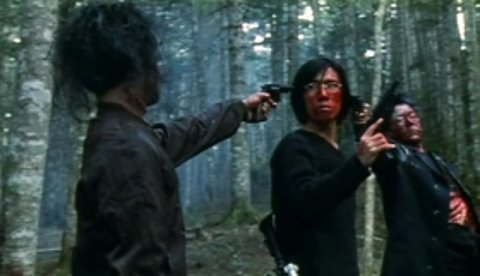
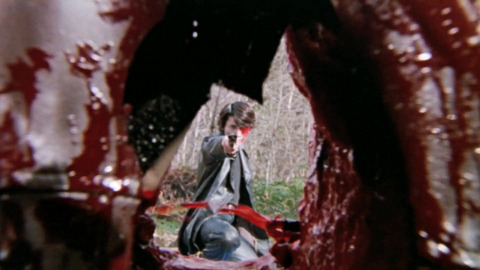

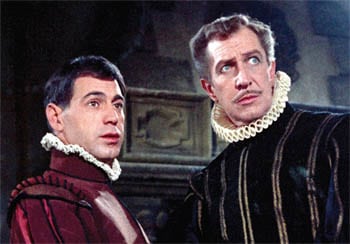
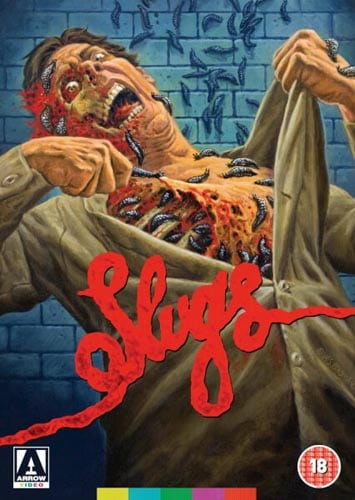
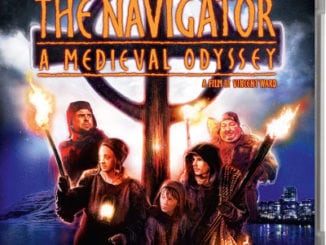
Be the first to comment